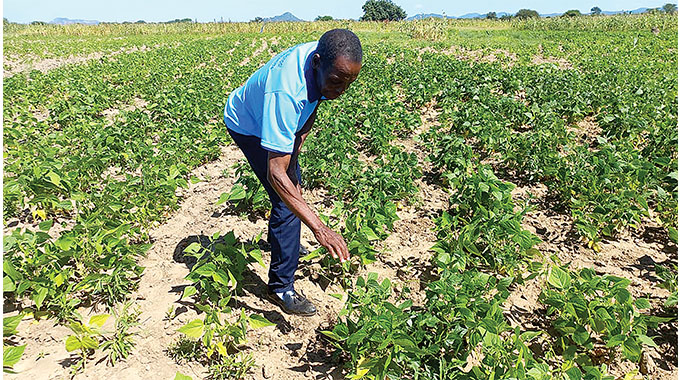Home-grown feeding programme at Colleen Bawn school

Sukulwenkosi Dube-Matutu, Matabeleland South Bureau Chief
THE community of Dubane in Colleen Bawn, Gwanda, has started a home-grown school feeding programme after establishing two gardens where they are growing crops to feed learners at Colleen Bawn Primary School.
The home-grown school feeding scheme is a Government-led programme that aims to improve the health and educational outcomes at public primary and secondary schools.
It is a system where the community produces a wide variety of food crops to be used in preparing school meals for learners such as sugar beans, vegetables, beans, potatoes, sweet potatoes, carrots and fish among other products.
The programme fosters food and nutrition security and is in line with the Food and Nutrition Security Policy Strategy. Government adopted the school feeding programme as a strategy to achieve optimal enrolments, attendance, retention and school completion rates with positive learning outcomes in order to achieve Vision 2030.
In line with the African Union Decision of January 2016, the Government adopted the home-grown approach to the School Feeding Programme, using a phased approach, beginning at infant school level in 2016 and expanded to Junior school level in 2017, while the final phase will bring in the secondary school level.
One of the school feeding gardens in Dubane area has been established at the homestead of Dubane Village head, Mr Enock Sibanda.

Soya beans
The two gardens each covering one-and-a-half hectares were established last month.
Community members planted soya beans which will be supplied to Colleen Bawn Primary School to feed learners.
Stakeholders visited the garden on Wednesday for the launch of the Gwanda school feeding programme which was held at Colleen Bawn Primary School.
Mr Sibanda said the community decided to come up with the initiative after attending a workshop on the importance of school feeding programme and the role of parents in ensuring its success.
“We attended a workshop as village heads where we were told about feeding children. I then engaged community members and we decided to set aside land to produce food for our children. We have established two gardens in our area towards the programme. The villagers are the ones who work here to produce food. We planted our soya beans last month and once they are ready we will supply them to the school,” he said.
“We plan to increase our garden as time goes on because we don’t want our children to go hungry at school as this will affect the learning process.”
Another villager, Ms Precious Dube, said the community is actively involved in the garden project and they were concerned about the welfare of their children. She said they were in need of a borehole so that they could produce food for the children throughout the year. Ms Dube said for now they were relying on rain water for their crop. She said a reliable water source will enable them to grow a variety of crops.
Colleen Bawn Primary headmistress, who is also the Colleen Bawn cluster chairperson, Ms Sphiwe Sibanda said the cluster committee engaged various village heads from the area on the school feeding programme. She said four gardens which will feed three schools in the cluster have been established so far.
She said the school feeding programme plays a crucial role in the success of the education sector.

Gwanda acting district development co-ordinator, Mr Thulani Moyo
Ms Sibanda said the target is for all villages in the cluster to establish gardens that will support all 10 primary schools in the area.
“We started the school feeding programme in 2018 where we were getting grain from Government. Before the programme our enrolment was around 450 but now it has increased to over 600 learners.
Government is no longer providing grain as communities working with the SDCs are now supposed to mobilise food for the children. It’s important for the feeding to continue so that children stay in school.”
Speaking during the event Gwanda District Development Co-ordinator, Mr Thulani Moyo urged various stakeholders such as the business community and parents to assist in making the school feeding programme a success.

The Ministry of Primary and Secondary Education
“In the past the Government had been providing maize with no relish. The last grain assistance was in term one 2018. Secretary’s Circular No. 5 of 2019 points out that, while the Ministry of Primary and Secondary Education is responsible for school feeding, the success of the Home Grown approach requires mutually beneficial linkages with other ministries and stakeholders,” he said.
“The Home-grown Feeding Programme requires the active participation of ministries responsible for agriculture, health, social welfare, Women Affairs, Youth and finance. It operates in such a way that the demand for agricultural produce is created through the design of nutritious school meals which offer a balanced diet to all learners on every day of the school calendar.”
Mr Moyo encouraged schools to utilise the available space, land, school fields and gardens to enrich learners’ curriculum experience in agriculture related learning areas to strengthen their applied learning competencies in food production processing and enterprise as part of the national development thrust.– @DubeMatutu








Comments